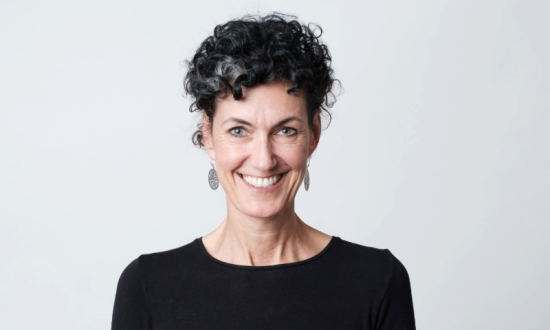Nancy Giordano is an exponential strategist, business futurist, and bestselling author who has consulted on a portfolio of $60+ billion well-known brands and given more than 100+ global keynotes. With a drive to help enterprise organizations and visionary leaders transform to meet the escalating expectations ahead, she advises leaders on the organizational structures and new mindsets necessary to effectively harness the significant technology innovations heading our way.
Nancy’s expertise and experiences range from A.I., to frozen foods, to reinventing the internet, and all of her projects have a key common denominator: transitioning away from the extractive operating systems and outdated business thinking that no longer holds up… to create the more sustainable, inclusive and dynamic solutions the future demands. She is the author of the Amazon bestselling book Leadering: The Ways Visionary Leaders Play Bigger, a frequent panelist at South by Southwest, global keynote speaker, Singularity University guest lecturer, and the world’s first TEDx licensee. She is recognized as one of the world’s top female futurists, and is co-Founder of the Femme Futurists Society.
Recently, in an exclusive interview with CXO Outlook Magazine, Nancy shared her professional trajectory, the inspiration behind establishing Play Big, Inc, the major takeaways from her best-selling book on Amazon, significant career milestones, future plans, pearls of wisdom, and much more. The following excerpts are taken from the interview.
Hi Nancy. Please tell us about your career path and areas of interest. How did you get to becoming a strategic futurist?
How people behave and how systems work have always fascinated me, so I studied both Economics + Psychology and was excited to discover the field of advertising. I began my career in several of the top agencies in NYC, Chicago and Los Angeles, and my strategic work expanded as new technologies and cultural priorities advanced, from the emergence of the internet and the mobile/social revolution to a desire for more sustainable and healthy lifestyle options.
I loved helping global companies build more meaningful relationships with their stakeholders, but soon found it surprising (and frustrating) to see how often these large organizations struggled to absorb and respond to quickly changing conditions, even as they were under tangible threat. This made me really curious to see how dynamic tech start-ups did it differently, and more than 8 years ago I became part of an AI start-up. Around the same time, I became the world’s first TEDx licensee and began designing experiences that helped folks meet the ideas and people leading the change.
A friend also asked me to produce an executive conference on the most significant tech advances – including AI, robotics, additive manufacturing, spatial computing and more – and as I did, it became even more clear how unprepared most of us are for the big changes coming to every single industry. I became a Strategic Futurist to help bridge that gap… and recently I “promoted myself” to Exponential Strategist in order to better highlight the extraordinary impact and responsibility our decisions carry at this unique moment in time.
What was the inspiration behind establishing Play Big, Inc?
A close friend and colleague once introduced me as “endlessly optimistic and one who sees the potential in everything”. Interestingly, this comes with both pros + cons, as I learned early on that I have a unique ability to connect a lot of disparate dots (often described as “sensemaking”) but not always the patience to wait for others to see them, too. As such, I’ve been eager to help leaders accelerate their understanding of changing conditions as well as more deeply appreciate the systemic impact of their decisions. I’m passionate about helping leaders with tremendous resources direct and invest them in more intentional, consciously aligned ways that don’t simply extract but actively create value across the board, now and into the future.
As I built my own strategic inspiration consultancy, I resonated with author Marianne Williamson’s invitation that: “Your playing small does not serve the world”, and believe we play big when we align our work, our personal values and our responsibilities to society to ensure a safe and thriving life for everyone by, for example, rebuilding a more human internet, designing sustainably and recognizing the value of unpaid care work in our economic modeling.
This is a powerful moment in which our choices – individually and collectively – are shaping the future for generations to come. Which means that the bigger we play, the better the outcome.
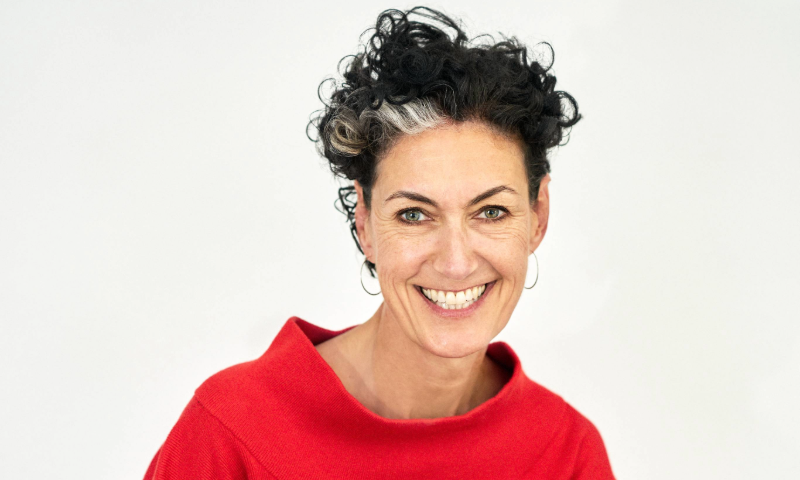
You help enterprise organizations and visionary leaders transform to meet the escalating expectations ahead. Are organizations more excited or apprehensive about the future?
I spend a lot of time with the people who are literally building the future – the technologists, scientists, designers, entrepreneurs, investors, etc. – who believe we have barely scratched the surface of what is possible; some even believe we could be on the verge of as many as fourteen internet-sized transformations! Can you imagine? While that is really hard to wrap our minds around, we are beginning to see/feel that old systems are breaking down while the shape of the new is not fully visible yet. As we try to make sense of quickly advancing concepts like generative AI, cryptocurrency, distributed energy grids, personalized education and circular economic systems, we are standing in what I describe as “the Liminal Gap” – this space between what is familiar and what is not.
Those still operating with an outdated playbook are struggling to apply old approaches and regulations to a new world, which frankly, is frightening. Others find this is a very exciting time as they are eager to transform everything from education to finance to food systems to economic metrics in ways that balance economic vitality and ecological stability and offer access to more people (e.g. regenerative agriculture). They see this as a moment we can transition from a highly extractive, exhausting and exclusionary past to a thriving, equitable and harmonious future. To make this shift, however, requires a different way of thinking, operating and measuring our investments and progress.
Can you please share the major takeaways from your book, “Leadering: The Ways Visionary Leaders Play Bigger”?
As I tried to unravel why so many accomplished leaders struggled to adapt to changing conditions and prepare for the impact of advancing technologies, it became really clear that what lead to success in the 20th Century industrial era was actually not at all what is required now in the exponential productivity transformation of the 21st Century – and that relying on this outdated way of thinking is actually quite dangerous, both for the organization and for society.
LeaderSHIP (the noun) was an approach we were all taught these past several decades that was intentionally designed to be static, closed, hierarchical and push away variance and rapid experimentation in order to scale efficiently and deliver consistent short-term profitability. However, as the environmental and societal externalities mount – and as the technologies advance ever faster – this slow, narrow-minded approach no longer holds up. What you see instead when you look at those navigating through the liminal gap more successfully and confidently is that they are adopting a more adaptive mindset I describe as LeaderING (a verb); one that embraces practices that are dynamic, inclusive, and systemic to support continuous innovation/experimentation for long-term, stakeholder value creation. These incentivize – versus discourage – organizational curiosity and learning; they actively build ecosystems of collaboration inside and outside the organization; they rethink “risk” and embrace those at the edge closest to the customer/market vs those with the most tenure closest to the top. The most successful leaders today are guided by a sincere “why” that transcends a tactical “how,” and which opens audacious opportunities.
My book gives loads of examples – from Microsoft to Martha Stewart – of leaders and organizations that continuously and successfully lean into change and have shifted away from short-term extraction to longer-term value creation in ways that acknowledge and embrace their social license to operate. Excitedly, these exist in every industry.
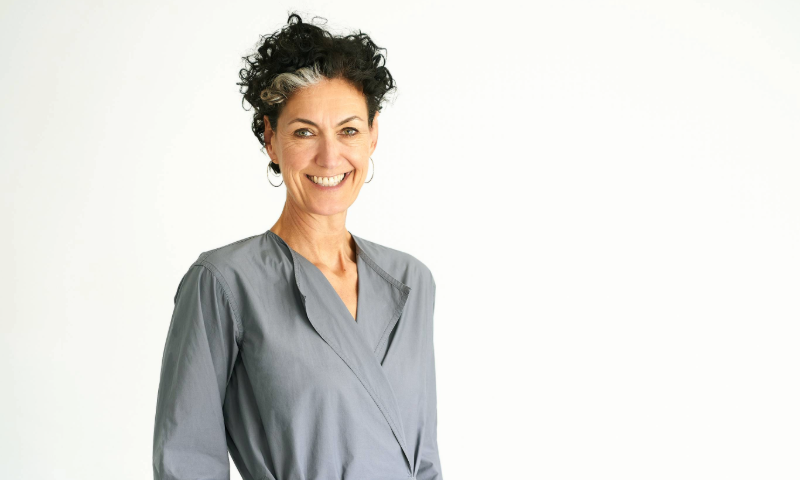
Please brief us about the mission and vision of Femme Futurists Society.
As I became invited to share my insights and energetic POVs via keynotes around the world, I was often the first and/or the only woman on the stage in this capacity. I also noticed that my well-meaning but unaware male colleagues only referenced men as innovators or visionaries in their talks, unintentionally further pushing women’s contributions into the dark. And I have become really concerned by the statistics that show women are becoming less engaged (and almost never funded) in the fastest growing industries – from AI and cybersecurity to robotics, fintech and healthcare and more – even though all the research shows that organizations with diverse teams are more profitable, more innovative and less biased (and thus safer) in their decision-making.
I was especially excited then to see lists of other women making substantial inroads as futurists, technologists and entrepreneurs and wanted to both meet and spotlight them. My colleague Emma Pezzack and I co-founded The Femme Futurists Society as a way to do this, and she and I have spent the last several years taking turns inviting these engaging, brilliant, self-assured and uniquely self-directed women to have conversational interviews with us in order to learn more about their work, their paths and their passions.
How do you think we can encourage more females to fulfill their goals of entering this industry and why do you think this is important?
To become a trusted voice at a time of so much uncertainty, women need to see more of each other’s perspectives and appreciate that our way of thinking/approaching things is both necessary and welcome. Overall, we believe in the need to balance the dominant masculine worldview with the currently massively underrepresented feminine and are creating this space to amplify the women around the world and across domains who are framing and championing big transformations in how we work, play, govern, discover, collaborate, learn, and ultimately connect, coordinate and create.
By sharing their insights on emerging technologies, shifting cultural expectations, scientific breakthroughs and vision for a thriving future that works for all, our hope is that we can get everyone deeply motivated by the possibilities…and confident in building them too.
It is also critical, by the way, that women reap the financial rewards of all this innovation so that we can also invest in the future we wish to see.
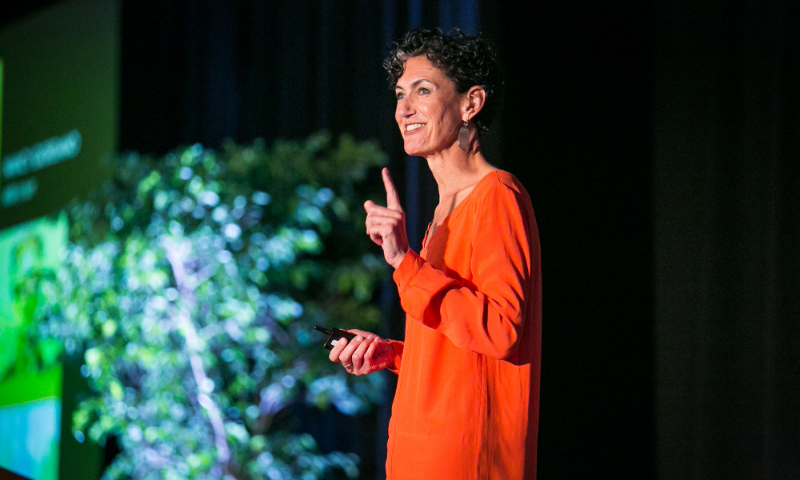
According to you, what will successful leadership of the future look like?
I firmly believe that we need to put humanity at the center of all our decision-making (rather than focusing on relentless growth). We need to think long-term (vs short-term) and consider all stakeholders (not only investors). We need much more diverse teams, we need to look more deeply at our own patterns, triggers and biases in order to be more open to new ideas, new approaches and harmful blindspots. We need to take much better care of youth around the world and give their needs and ideas much more attention. And we need to lead in more dynamic, fluid and caring ways.
We will be confronted with so many provocative new ideas and concepts – from 4 day work weeks and psychedelic healthcare to fair climate transition investments and space collaboration (vs colonizing) – that require we work with others around the world in truly whole-hearted and open-minded ways. I see the work of the future this way:
We all deserve to be well held….
By each other, in respectful, caring communities.
By the systems we design, to ensure they are inclusive, sustainable and future-focused.
By the technologies we advance, they first and foremost are fair, ethical, accessible and safe.
And by the stories we tell about what is possible, that excite and encourage us to build an even better next.
What is it that motivates and inspires you in your everyday life?
Fifty percent of the world is under age 30; 42% is under age 25. They so deserve to have the kind of peace of mind we did growing up. As the folks in charge now, we owe them a safe world and a caring, optimistic transition from the industrial economy to this next regenerative and digital one. As a “futurist mom”, the world’s children are my primary motivation.
I also believe we are at the most exciting time in history in which every single industry and societal construct is up for rethinking and can now be more consciously and thoughtfully designed to support the needs of the planet and each other with the wisdoms of indigenous leaders, youth, women and nature itself showing us the way. I can’t think of a better time to be alive because the future is not happening to us, it is us!
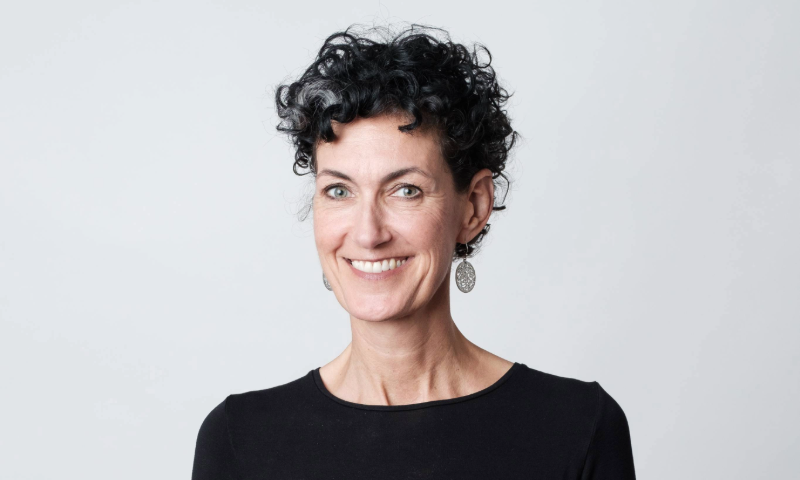
What are you particularly proud of in your career?
I’m proud I’ve been able to build a thriving career with people I really love while also being the kind of mother I very intentionally sought to be. I have three happy, curious, thriving young adult children all poised to make their own contributions and creations, and who take it for granted that we create work (both paid and unpaid) that inspires, takes good care of people and adds (vs extracts) value.
I’m proud I wrote a book – and named a concept – that better prepares visionary leaders for the changes to come and gives all the courage and inspiration to play bigger to ensure we all have the future we want. And am very grateful for the support, input and encouragement this idea continues to attract.
And I’m proud of the communities I’ve both created and been invited to be a part of, because as my friend Douglas Rushkoff puts it: “Being human is not about individual survival or escape. It’s a team sport. Whatever future humans have; it will be together.”
Where do you see yourself in the next 5 years?
I’m very interested in how we can more effectively, sustainability and equitably distribute the radical increases in productivity possible ahead; What does it mean to rethink the concept of “work” as technologies both augment and replace what we do now? How can we ensure all have safe and dignified housing, healthy food and quality healthcare as these are each delivered in very different ways ahead? How will the world change when all are connected via a distributed internet and have access to free education? What does it mean to build regenerative systems and how will this impact our motivation to work together to take better care of our planet and her finite resources? In what ways will our consciousness continue to expand, offering us a better view of what connects us to each other so we can appreciate the superorganism we likely are? And how will all this shape the socio-economic models of this future?
These are the questions I’m extremely interested in exploring and hopefully will be able to share in a new book and my first documentary film.
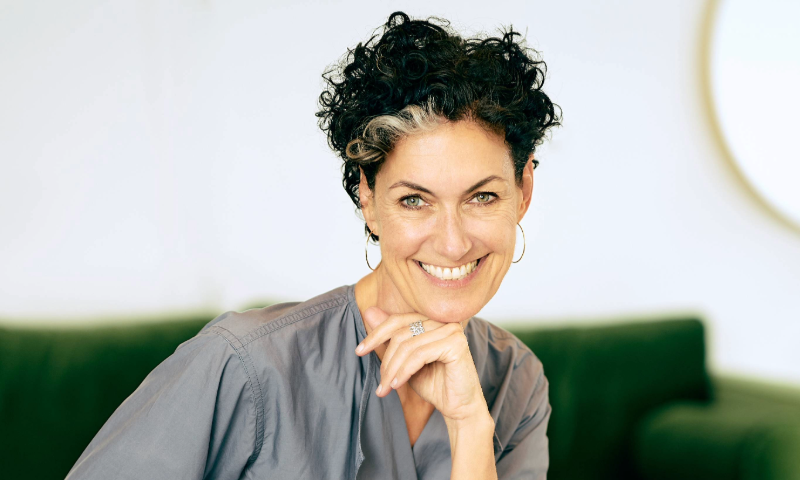
What would you recommend corporate leaders start taking action towards to prepare for the future?
We have to let go of the outdated map and accept that yesterday’s playbook is dead; clinging to these actually creates more risk and danger (not less). Instead, we must embrace and calibrate a dynamic compass that is able to continuously sense and respond to new information. These two questions guide mine:
- Do I see/understand what the future needs and expects?
- Can I see/appreciate what I am in a unique position to create and contribute to this future? (as an individual, a team, an organization, an industry, a community, a nation…)
I can’t underscore enough just how pivotal and fast-moving things are right now. We will be faced with many more complex societal and ethical questions even as new extraordinary solutions are made visible. As such, how we think is so much more important now that what we know.
So, take a deep breath and accept it is time for us all to play much bigger, together. The decisions we make now will have exponential impact for generations to come, so deepen your LeaderING practices and embrace that caring is at the heart of 21st Century success. With this approach it is possible (and very exciting) to step into the unknown with the awesome combination of humility and confidence. Thank you!


